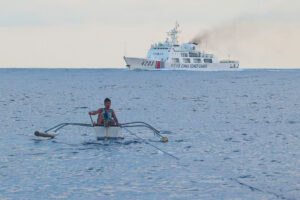
Philippines expresses ‘displeasure’ with China over Saturday’s collision
By Kyle Aristophere T. Atienza and John Victor D. Ordoñez, Reporters
THE PHILIPPINES on Monday said it had expressed its displeasure with China after another collision of their vessels that it said didn’t help in efforts to cool tensions in the South China Sea.
“We have made the necessary approaches to China in terms of contacting them through various means to express our complaint and displeasure at what happened,” Foreign Affairs Secretary Enrique A. Manalo told reporters at the presidential palace.
Mr. Enrique said the Philippine side had raised its concern over the fact that the Philippine Coast Guard (PCG) vessel that was hit by a Chinese vessel thrice near Sabina Shoal at the weekend was just practicing innocent passage.
He said the Chinese side, in response, “accused us, as usual, of doing this and that.” “We’re contemplating, at the moment, possible approaches to this issue,” Mr. Manalo said when asked whether Manila would lodge another diplomatic protest against Beijing.
“I think, maybe, in the coming days or weeks, we’ll probably have a better picture of where we’re headed for this.”
Mr. Manalo said the incident “doesn’t help the situation” in the South China Sea, one of the world’s most important waterways that China claims almost in its entirety.
A Philippine task force handling sea disputes with Beijing on Saturday accused a Chinese vessel of “deliberately” ramming the Philippines’ largest coast guard vessel named BRP Teresa Magbanua thrice near Sabina Shoal.
The Chinese Coast Guard vessel caused significant damage to BRP Teresa Magbanua and endangered the lives of its personnel, the task force said.
The Chinese side made a similar claim, with Coast Guard spokesperson Liu Dejun saying the smaller PCG vessel had “deliberately” collided with their ship.
“China exercises indisputable sovereignty” over the shoal, he said on Chinese state broadcaster CCTV, condemning what he called “unprofessional and dangerous” conduct of the Philippine ship.
The 97-meter-long BRP Teresa Magbanua has been near Sabina Shoal since mid-April, as Manila has accused Beijing of dumping dead corals at the atoll to alter its elevation.
Sabina lies 140 kilometers off the Philippine westernmost island of Palawan and is part of the Spratly Islands.
Sabina has been a staging ground for Philippine resupply missions to Second Thomas Shoal, where Manila grounded a Navy vessel in 1999 to serve as an outpost for a handful of Filipino troops.
Manila and Beijing came up with a resupply deal in July after a June 17 standoff in which Chinese forces threatened, using bladed weapons, Filipino troops delivering supplies to the Navy outpost.
The Philippine side said the Saturday collision was the fifth incident of Chinese harassment at sea in August.
The Philippine Department of Foreign Affairs (DFA) last month said the government of President Ferdinand R. Marcos, Jr. had filed 173 diplomatic protests against China from July 1, 2022 to Aug. 12, 2024, 40 of which were lodged this year.
‘UNPROVOKED AGGRESSION’
Meanwhile, think tank Stratbase ADR said joint patrols, escorts to resupply missions and external defense capacity-building efforts with like-minded partners would help the Philippines exercise its “sovereignty, territorial integrity and economic rights” within its exclusive economic zone.
“The Philippines, as a maritime nation supported by friends and partners, will not back down in the face of this aggression,” Stratbase President Victor Andres C. Mahit said in a statement.
“The institute underpins the importance of reinforcing alliances and elevating partnerships through joint patrols and exercises to respond to threats posed by antagonistic states like China,” he added.
The think tank described Saturday’s incident as “an act of desperation” on China’s part that violated international law.
The Chinese Embassy in Manila did not immediately reply to a Viber message seeking comment.
The United States, New Zealand, and Australian embassies have expressed concern over the incident, urging China to follow international law.
Last month, the US and French navies held war games in the Philippine Sea to advance their interoperability “in support of a free and open Indo-Pacific,” according to the US 7th Fleet.
Manilla, Washington, Ottawa and Canberra held their first joint military exercises in the South China Sea on Aug. 7 and 8 amid Beijing’s increased military buildup in the waterway.
“Chinese behavior, including repeated incursions of its vessels into Philippine territory, unprovoked aggression and the propagation of disinformation are clear violations of international law,” Mr. Manhit said.
Also on Monday, the DFA urged the Senate to ratify a United Nations (UN) agreement on the conservation of marine life and resources beyond a nation’s jurisdiction amid recent sea scuffles with China.
In his speech at a symposium in Makati on the UN agreement on Marine Biological Diversity of Areas Beyond National Jurisdictions (BBNJ), Mr. Manalo said his agency was working with the Senate to refine the country’s laws on marine resources.
“To achieve the goal of conservation and sustainable use of marine biological diversity, the international community must continue to strengthen international cooperation and coordination, especially through the BBNJ agreement,” he said, based on a copy of his speech sent to reporters via WhatsApp.
The UN agreement entails international cooperation in promoting environmental impact assessments and capacity-building in the transfer of marine technology.
The Philippines signed the treaty at the 78th United Nations General Assembly (UNGA) in New York in September last year.
Congress has approved a bill that seeks to set up Philippine sea lanes and another establishing maritime zones to assert the country’s territorial claim over the South China Sea.
The Senate last month passed another bill that tasks the government to draft a plan to manage marine and coastal resources to cut land and sea-based pollution and overfishing.
“The agreement embodies our collective response and responsibility towards ensuring the health and productivity of our oceans for generations to come,” Mr. Manalo said.



